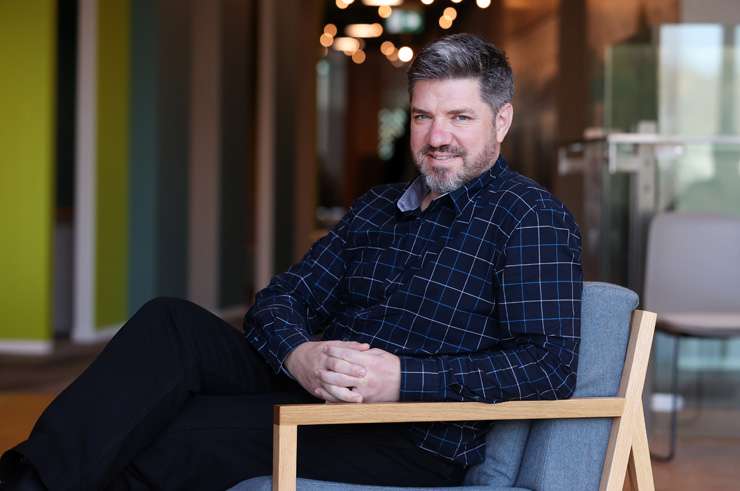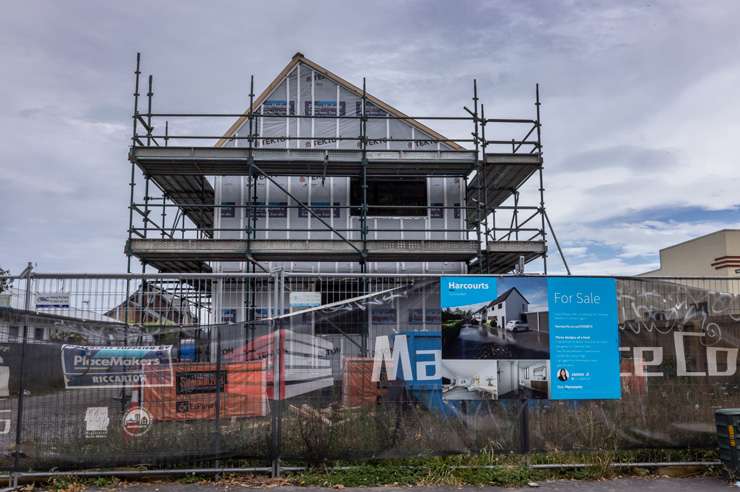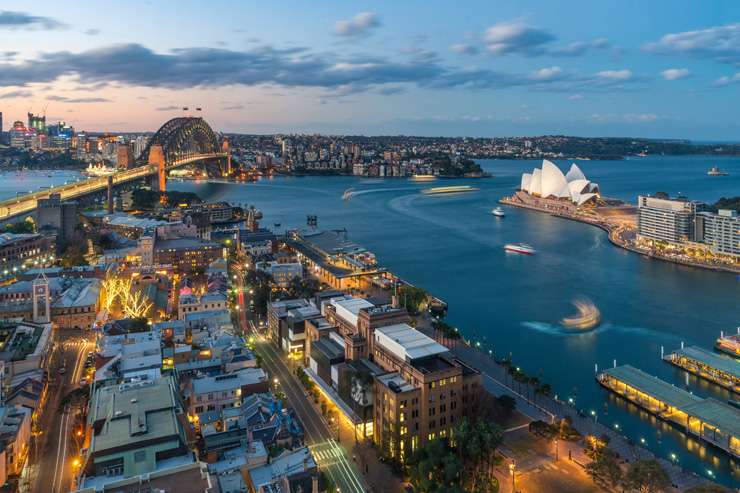Jarrod Kerr has lived in a townhouse in Sydney and an apartment in Singapore (with his wife, son and two dogs). Both countries have lessons for housing in New Zealand, says the 45-year-old chief economist for Kiwibank who spent most of his adult life working overseas before coming home nearly five years ago. He talked to OneRoof about how he got into economics, his views on the housing market and how to end the lack of affordable housing in this country.
Q. Aren’t you Australian?
Well, that’s an insult, ha. Yeah, no, living in Australia I copped it for being a Kiwi and every time I came home I copped it from my mates for sounding like an Australian.
Q. Where did you grow up?
Start your property search
In Auckland. I was born in Hamilton, which I don’t normally tell people in public but I was. And then my parents moved up, I think I was one or two at the time, so I spent most of my life in Auckland.
Q. How did you get into economics?
I was a hopeless student, one of those ones that struggled to focus on anything. My economics teacher taught in a way that I really liked and I found out I actually had a love of finance and economics. He took me under his wing a little bit and got me studying hard. Sure enough, my last year of school I got I think 85% for economics and the rest were that sort of 50%-60% mark so I scraped through with an A bursary, all on economics, nothing else. I said to him ‘what do I do now’, and he said ‘there’s an applied economics degree at Massey University, go do that’. So that’s what I did.
Q. What did you do after Massey?
I still didn’t know what I wanted to do with my life so I did my Bachelors, spoke to my lecturer and he said ‘do an Honours’ so I did an Honours; ‘what do I do now?’, he said ‘do your Masters’, so I did my masters. ‘What do I do now?’ He sent me over to Australia and said ‘we’ll get you working for this research outfit and start a PhD’. I thought fine, so I went to Australia and started a PhD and never finished it. I ended up getting a job at JP Morgan which was my big break, actually. I would have been 25 or 26.
Q. Did you like Australia?
I completely loved the place. Australia is so similar to New Zealand. We’ve got very similar banter, a very similar love of sports. I’d say the Aussies are more intense and more crazy for their sport, they love everything over there. A big part of the conversation every Monday is what’s happened to the sport over the weekend, it’s not just a male-dominated conversation either.
Q. When did you buy your first home?
I was asked very early in my career, in 2004, by one of the traders on JP Morgan’s trading floor, "What’s your view on housing?" I said, "I don’t really know." He said, ‘Well, come up with a view and come back to me’, so I spent a bit of time on it and I realised there was a shortage and I said I think house prices will keep going. He said, "Look, there’s one way to look at housing - you’re either long, short or neutral." What he meant by that was you are short if you’re renting, you’re neutral if you own your own home and you’re long when you’ve actually taken an active position; if you not only own your own home but if you own investment properties. He said to me very sternly, "You are currently short in a market which you think is going up." That was probably one of the best pieces of advice I’ve ever received. I then saved my way for a few years and got myself a deposit, scraped in, and I purchased in 2006 or 2007 a small little townhouse in Sydney.
Q. What are you now – long, neutral, or short?
Long. I definitely have investment properties (including an apartment in Australia) and we own the home we live in in Auckland.
Q. How did you get to end up in Singapore?
After I left JP Morgan I worked for CBA, which is the owner of ASB, and I was there for two years and got poached and offered a dream job in Singapore. I went to work for Credit Suisse in Singapore for a number of years.
Q. Why is housing so important to economies?
To Australia and New Zealand it’s more important than a lot of other countries. There are some parts of the world, like Europe for instance, where home ownership is actually quite low and people, through a better set up rental market, are quite happy to rent their entire lives.

Kerr says the attitude to home-ownership in New Zealand and Australia is quite different to that in other countries. Photo / Fiona Goodall
Q. Why are Antipodeans different?
I think probably because of how we were set up. We’re colonies, people come over here and they want to make something of themselves. Right back to the start I think you carve out a hunk of land and it’s yours and you work it - I think it’s just part of our DNA. A lot of people want to own their own home and fair enough, I think that should be something that is attainable for most people and unfortunately it’s not. It’s very unaffordable when you look at what most people earn and what most people have to pay for a house so there are some problems there that need to be fixed and that will take years. Housing is our Achilles’ heel.
Q. Is that because we’re so emotional about housing?
Absolutely. Plus, we’re financially leveraged into it. Most of us who own a home have a mortgage and we’re fighting tooth and nail to pay that off as fast as possible.
Q. What’s different in Singapore?
They provide a lot more homes for their citizens. They’ve got this housing development plan where they build lots of apartments and they are built at a price people can afford and people are basically forced saving into the scheme so home ownership rates are pretty high in Singapore, they do it really well. People take a lot of pride in where they live because they own it. It’s not like providing New Zealand’s social housing, it’s, like, providing an ownership structure to people.
Q. Are there lessons for New Zealand?
Definitely. We could do a lot more as a country to provide the right infrastructure in the right areas and then really encourage the new technologies that we’ve got internationally to build cheaper and better quality homes. The thing is, you look at our housing market and you say ‘oh, it’s a disaster, there’s not enough homes out there, there’s no way we can fix it’. Well, actually, there is.
Q. How can we fix the shortage?
There are prefabricated buildings that they’re doing overseas. It works, it’s been proven, it comes through cheaper. We’re quite spread out so the ability to build at scale is an issue in New Zealand. I went to the Rethinking Housing conference (in Auckland). I remember talking to a couple of local builders and (them) saying ‘we just listened to this guy who built 100 houses in a few weeks overseas’. They basically said ‘look in order for us to do that we would need to obviously build the infrastructure, the warehouse and whatever to make these prefabricated things, and we would need guaranteed 1000 houses a year to cover our costs and I’m not sure we could do that. We’re some of the largest builders in New Zealand and we do a few hundred houses a year – we can’t get to that scale’. This is where I think Kainga Ora will play an important role going forward because they can pull people together. I think we’ve got a lot of excuses but there’s a lot of answers out there, too.
Q. We’ve had record consents and building in the last few years – are we still short of houses?
Yeah, we are. It will hopefully iron itself out in coming years but even then scratching beneath the surface I think there is still a shortage of affordable dwellings for those that want to make it into the market for the first time. We’re great at building $1m-plus properties – we’re not so good at doing $500,000 ones.

A townhouse under construction in Christchurch at the start of 2022. Kerr says there has been a shortage of affordable homes in New Zealand. Photo / Peter Meecham
Q. What’s your view about the wealth gap in New Zealand?
Inequality generally widens during recessions. Recessions hurt the poorer more than the wealthy, and 2008 was an absolute cracker of a recession so there was a significant widening during that. Now we’ve had the pandemic, which obviously impacted poorer households more than wealthy yet again so there’s been another wave coming through. A lot of it is to do with the way we deal with recessions, and that is to stimulate as much as we can and then you see financial assets like housing take off. Clearly, the owners of those assets do well because that’s where the stimulation is targeted or has its greatest impact. Even during the nightmare of the recession itself it’s the poorer workers who generally lose their jobs or spend more time out of work than the wealthier so it’s a bit of a double whammy, not only in getting hit financially more but you don’t get the uplift from the bounce back in asset prices.
Q. Is getting moving on affordable housing a key message of yours?
Absolutely, and sustainable, as well, that’s a key part of it. Making sure it’s energy efficient and that sort of stuff so it does actually stand the test of time. That’s the important bit. We can build cheap homes but they might fall apart in five years - they’ve got to be of a decent quality. We punch well above our weight in a number of areas but I think we’ve let ourselves down over recent decades. I think it starts with the under-investment in our cities and in the regions. We haven’t provided the infrastructure that we need. We don’t have the roads, the rail, and that’s important. We’ve actually got a lot of land, I don’t care what anyone says, you look at a map of New Zealand compared to parts of Europe – we have masses of land under-utilised. You know, 1.5 million people across Auckland, which is geographically a very large city, is a very low population, actually. We think it’s large but it’s tiny (compared to other cities of the same geographical size) so there’s plenty of scope for intensification.
Q. Would Kiwis cope with such large-scale intensification?
The Kiwi dream of living on a quarter acre block – that was my grandfather’s dream, it’s not a dream I can attain. Having lived in Sydney, which is higher density, and having lived in Singapore, which is the definition of high density, you get used to it real quick. I never thought that I would live in an apartment and there I was with a wife and a child and two dogs, living in an apartment in Singapore.

Sydney, Australia. Kerr says Australia has been better managing housing market supply and demand. Photo / Getty Images
Q. What about Australia? What can they teach us about housing?
They had a mining boom over there which was absolutely incredible. They poured billions of dollars, I mean billions of dollars, into developing mines for L&G and other stuff. Australia is a pretty lucky country - you pretty much dig a hole anywhere and you’ll find something shiny at the bottom of it. They fall over themselves into wealth. But they had this mining boom which was really incredible … and they took basically everyone out of construction and other areas and threw them into mines. They didn’t build enough houses through the mining boom, obviously they put all their resources into digging holes, and then after the mining boom there was a chronic shortage of houses and house prices were reacting to it. So then they took those people from the mines after the boom and they went back and did residential construction, and jeez did they build. They built townhouses after townhouses, apartments after apartments, and in 2016, 2017 you started to see an oversupply of housing in Australia, particularly in apartments and townhouses. They ended up building too many. That’s a foreign concept to New Zealanders.
Q. What happened to the market?
From that point on prices went down and they corrected for a few years and now they’re correcting again. The Australian housing market is far better in its supply and demand balance than ours, and they’ve showed us exactly what happens and what politicians, central bankers and pointy heads like me all want to happen, and that is if you increase the supply the price either goes sideways or down. That is, the housing market becomes more affordable and Australians are much better off because of it. It’s something we would love to engineer here and I think we’re definitely seeing it. We’re seeing a lot more supply relative to demand thanks to our borders being closed - I can only hope it continues.
Q. Could we end up with an oversupply?
I hope so. I think so. If we can keep building at the same rates that we’re building at now over the next five years there’s a very good chance we’d get a bit of an oversupply and that’s a bloody good thing. That would be a badge of honour, something to be proud of, that we’ve tackled this housing shortage. Because I think it really is a stain on our country that we haven’t provided the infrastructure that we need for this country for decades. It’s the biggest embarrassment around, and that’s across everything, from the debacle in water and the fact we don’t have the right transport. I think one of the big reasons we have very low productivity growth is this lack of investment over recent decades. We would be far better off as a nation and per person had we invested more over the last three decades.
















































































